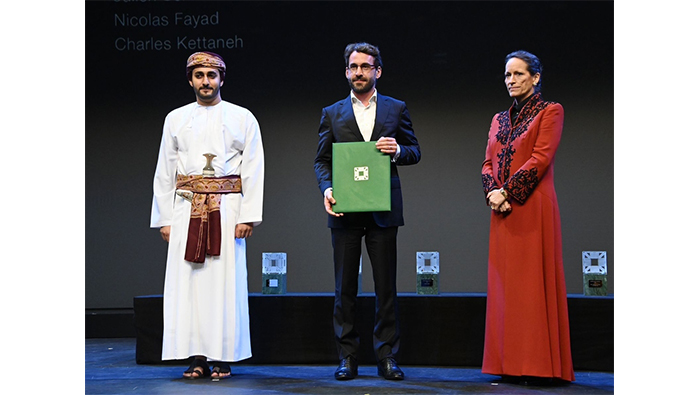
Muscat: His Highness Sayyid Theyazin bin Haitham Al Said, Minister of Culture, Sports and Youth on Monday patronised over the concluding ceremony and the coronation of winners of the Aga Khan Award for Architecture in its 15th cycle.
The event was held in the House of Musical Arts at the Royal Opera House Muscat (ROHM).
The ceremony included a statement given by Farrokh Darekshani, Director of the Aga Khan Award for Architecture who said: “Since the first Award ceremony in 1980, we have celebrated the winners of each triennial cycle in all over the world, in places where Muslims are present and where they have enriched cultural heritage. These include the Topkapi Palace in Istanbul, the Alhambra in Granada, Registan Square in Samarkand as well as important sites in Pakistan, Morocco, Syria, Egypt, India, Indonesia, Malaysia, Qatar, Portugal, United Arab Emirates, and Russia, and now in Oman.
“It is a great honour that today we gather here in Oman, a country steeped in history, rich in culture and where tradition is the foundation for the future.
“We bring to the world’s attention six exemplary projects that showcase the power of architecture to bring people together, to inspire communities, to make physical the aspirations of societies, and to improve the quality of life.“
“Architecture is a collective enterprise that entails the creativity, innovation, vision, and input from a host of players – from architects and clients - to fabricators, masons, and craftspeople. We see in the six projects, we celebrate this evening, a spirit of inclusivity and pluralism that is the essence of the Award in its ongoing mission to recognise excellence in architecture.”
On his turn, Sayyid Said Sultan Al Busaidi, Undersecretary of the Ministry of Culture, Sports and Youth for Culture gave a statement in which he said that the Sultanate of Oman’s hosting of the Aga Khan Award for Architecture and Music comes within the framework of supporting the cultural strategy goals.
The event, he added, also highlights Oman’s role in contributing to the international cultural scene. In addition to affirming the importance of partnership with local and international establishments in cultural fields.
Afterwards, Princess Zahra Aga Khan gave a statement saying: “Oman is a country that is proud of its rich, traditional methods of building and living, while also embracing new technologies and techniques. Celebrating the Award here in Oman reflects a deep and shared conviction that buildings can do more than simply house people and programmes, they can also reflect our deepest values.
“Architecture has immense potential to improve the quality of life when done sensitively and well. It is this rigorous pursuit of hope for a better future that has characterised the Aga Khan Award for Architecture from its inception. Created in 1977, the Aga Khan Award for Architecture is not simply a prize – it is an intellectual search, an inclusive process, one of deep reflection and meaningful action.
“Over the years, the Award has been a lighthouse to those who feel we can design and build differently; to those who believe we have a responsibility to build appropriately – with thought, with consideration, and with the knowledge that architecture at its best is an inherently pluralistic enterprise.
“The six projects we honour tonight are beacons in our collective search for solutions and will help point the way forward for others.”
The coronation ceremony included a musical interlude performed by the Aga Khan Master Musicians. Films were also screened to highlight the winner projects of the Aga Khan Award for Architecture in its current cycle.
At the end of the ceremony, HH Sayyid Theyazin felicitated the winner projects. Those projects are “Kamanar Secondary School” from Senegal, “Community Spaces in Rohingya Refugee Response” from Bangladesh, “Renovation of Niemeyer Guest House” from Lebanon, “Urban River Spaces” from Bangladesh, “Argo Contemporary Art Museum and Cultural Centre” from Iran and “Banuyawangi International Airport” from Indonesia.
Winners of the “Community Spaces in Rohingya Refugee Response” project Saad Ben Mostafa, Rizvi Hassan and Khawaja Fatmi told Oman News Agency (ONA) that in their project they focused on working unconventionally in the field of architecture. They reiterated that receiving the Aga Khan Award for Architecture is the result of hard efforts in this field.
They also expressed their delight in visiting Oman and getting to know more about its cultural diversity.
Aga Khan Award for Architecture was established in 1977. It seeks to identify, encourage and promote building concepts that successfully meet the needs and aspirations of communities where Muslims have a significant presence since the inception of the award 45 years ago.